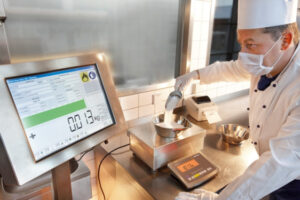
What are the food safety requirements for weighing in food manufacturing environments?
How do the BRCGS Global Food Safety Standard (BRC) and the Safe Quality Food (SQF) Program work within Food & Beverage Manufacturing? They are both regulatory bodies of the industry in which they are involved in the weighing systems such as load cells, scales, and check weighers to ensure quality standards. Also, they both require traceability to be national and international standards. The Scale People is an ISO 17025-accredited calibration and maintenance service provider. Here is an overview of BRC and SQF.
Basic Requirements by BRC for Weighing Equipment
Both programs use a weight to check how much total product is received. Also, they weigh small ingredients to ensure proper food or beverage products and packaging recipes. Plus, the packaging involves weighing the final food and checking for product giveaways. BRC’s clause requires that all equipment be built of appropriate materials. In addition, the design and placement of equipment should ensure it can be cleaned and maintained. Also, any equipment in direct contact with food should be suitable for food contact and meet legal requirements when necessary.
A documented planned maintenance schedule should include all plant and processing equipment. Inspection results should also be documented, and the repairs must be made immediately. Additionally, the company should ensure that the product’s safety or legality is not compromised during maintenance and subsequent cleaning operations.
Basic Requirements by SQF for Weighing Equipment
Furthermore, SQF is a reputable food safety and quality program designed to meet customer, industry, and regulatory requirements for food supply chain sectors. From the farm to retail stores, the program is widely recognized by brand owners, retailers, and food service providers. Their maintenance protocol includes the planning, scheduling, and execution of the methods and responsibilities for the maintenance of equipment and buildings. It prevents any risk of contamination of equipment or products. Moreover, their calibration of equipment includes the following:
- Calibration records should be maintained
- Calibration should be under an established schedule
- Their equipment must be calibrated against national or international reference methods and standards
- There should be documentation of the methods and responsibility for the calibration of chemical applications, and veterinary medicines
CONTACT THE SCALE PEOPLE FOR WEIGHING EQUIPMENT AND CALIBRATION SERVICES!
Since 1956, The Scale People have earned a reputation as the best service provider for calibrating and repairing weighing equipment in the mid-Atlantic area. Our sales team can help you to find the best weighing equipment for your application. We currently have offices in Columbia, MD, and Newport News, VA, but we offer our services nationwide. Over the years, we have built a long list of satisfied clients from various industries, including pharmaceutical, food and beverage, and government manufacturing. We are a fully ISO/IEC 17025:2017 accredited service company offering calibration for balances, scales, dynamometers, force measurements, test weights, pipettes, and more. All our services have a 100% satisfaction guarantee. We’re only a phone call away at +1 (800) 451-9593. Follow us on Facebook, Twitter, and LinkedIn to learn more about what we do.
